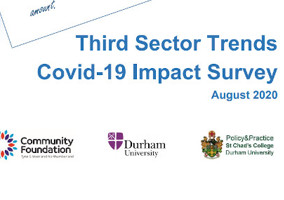More than 60% of community groups have been forced to close or decrease their services, research by community charity Groundwork has found.
Despite these findings, 67% of respondents say there is more need in their communities.
The report, Community groups in a crisis: insights from the first six months of the Covid-19 pandemic, examined the effect that Covid-19 and lockdown restrictions have had on community groups and their local delivery.
Over 2,600 people responded to a survey by Groundwork about the effect Covid-19 had on community groups during the last six months and what this might mean as we enter a second lockdown.
Lack of funding
Groundwork is calling for more be done to enable community groups to provide well-funded, tailored support to their local community as part of plans to mitigate the impact of the pandemic and prepare for the recovery.
Indeed, the report finds Covid-19 has also had a severe effect on funding streams, with 80% of groups reporting to have lost income and less than half of respondents saying that they feel very or extremely confident about continuing in future.
Findings in the Groundwork report show the increased need for support in more disadvantaged communities, which have seen an increased demand for emergency grants and a focus on ensuring vulnerable groups were looked after, including children and young people, older people, socially isolated people, low-income households, and people with disabilities.
Covid-19 restrictions have also affected the availability of volunteers, with 64% reporting that there were fewer active volunteers than before the pandemic.
Our income has diminished rapidly
In practice this means groups such as Liverpool Six Community Association are facing increased challenges.
Gerard Woodhouse, chief executive at Liverpool Six Community Association, said: “The impact of Covid-19 has been detrimental to our projects, particularly for our older residents and children.”
Woodhouse said that the association normally hold lunch clubs, afternoon tea events, cabarets and celebration parties on days like V.E Day, Easter, Christmas.
“At these events, we were combating loneliness and isolation by bringing our older residents together and ensuring they were eating hot nutritional healthy meals. We have altered our programme to ensure we are still in constant contact with our older residents by delivering weekly food parcels, afternoon tea boxes, and courtesy phone calls to check they are all okay,” he said.
Woodhouse added: “Our income has diminished rapidly as we would normally hold raffles and bingo's at these events to cover costs and are now relying heavily on our funding pages on social media. During the first three months of lockdown, emergency funding supported us to deliver the food parcels and cover petrol and volunteer expenses.
“For our younger children whom we would normally feed three times weekly at Youth Club and everyday throughout school holidays we are also delivering meals and activity packs and also hold competitions and activities, via hard copies and online, to ensure their mental and physical health and well being.”
‘The pandemic has highlighted the positive power of community action’
Positives of the report show that 84% of groups are still confident that they could help their communities to recover with the right support and are keen to work alongside local authorities and businesses to make this happen.
Graham Duxbury, national chief executive, Groundwork, said: “The pandemic has highlighted the positive power of community action, but the voluntary groups and organisations we rely on for a vast range of local services have been massively impacted by restrictions.
“Just as we continue to help businesses through the crisis we need to recognise that this ‘social infrastructure’ of community organisations also needs support. If we want to ‘build back better’ then having a thriving network of organisations able to help keep our neighbourhoods safe, healthy and green needs to be a critical part of the plan.”
Related articles












